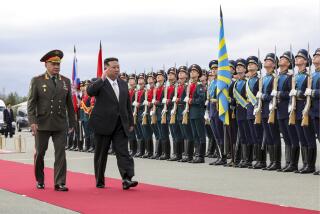Thatcherâs Mission to Moscow
Margaret Thatcherâs summit visit to Moscow, the first by a British prime minister in 12 years, was a remarkable diplomatic event. But apparently it failed to narrow differences over the most important item on the agenda: the question of how to deal with short-range nuclear missiles in Europe.
Thatcher and Soviet leader Mikhail S. Gorbachev spent more than nine hours discussing a variety of subjects--including human rights, the war in Afghanistan and arms control. The talks were spirited, but both sides found them worthwhile.
In an impressive display of how far the policy of glasnost , or openness, has gone, Soviet authorities raised no barriers to the British prime ministerâs meetings with three ârefusedniksâ--Jews denied permission to emigrate--and with Andrei Sakharov, the Soviet Unionâs leading dissident. The Soviet press, in a radical departure from the norm, carried full accounts of Thatcherâs frankly stated dissatisfaction with Soviet policies in several areas.
The British leader touched base before the trip with the French and the West Germans as well as with Washington. Thus on the issue of short-range missiles she was in effect speaking for Europe when she told Gorbachev that an agreement on the removal of medium-range missiles from Europe was not desirable unless it included language recognizing the right of the North Atlantic Treaty Organization to equality with the Soviet Union on the smaller, short-range missiles. Gorbachev objected that the West was merely trying to set up new roadblocks to arms control.
If the Soviets stick to that position, the otherwise bright prospects for a treaty on medium-range missiles could go glimmering.
At their October summit meeting in Reykjavik, Gorbachev accepted President Reaganâs so-called âzero-zeroâ formula under which all medium-range missiles would be removed from Europe. The deal fell through when the two leaders were unable to agree on the separate issue of restraints on research and development work on strategic missile defenses.
Recently Gorbachev again accepted the zero-zero formula on medium-range missiles, this time without the precondition of limitations on âStar Warsâ development. But, while professing a willingness to withdraw the shorter-range missiles that are on station in Czechoslovakia and East Germany, the Soviet leader says that this issue must be negotiated later.
To key European members of NATO, that isnât good enough. They point out that in the absence of further steps to maintain the military balance in Europe the removal of all medium-range missiles would leave the Soviets with a residual advantage in chemical arms, conventional weapons and, most important, short-range nuclear missiles. (The Soviets have at least 130 missiles with ranges of 300 to 600 miles on their side of Europeâs dividing line; the United States has none.)
Actually, not all U.S. military experts consider the potential Soviet advantage in these weapons terribly important as long as the overall nuclear balance is maintained. But, in keeping with the strong European misgivings, Washington insists that any medium-range missile treaty must include a Soviet commitment to the principle of equality in short-range missiles, with the details to be negotiated later.
Unless the Soviets really are determined to use a Euromissile agreement to tilt the military balance in their favor, sensible compromise should be possible. A medium-range missile agreement, for example, could allow each side to hold back on the removal of perhaps one-quarter of its missiles until a treaty on short-range missiles is negotiated.
Volker Ruehe, a key member of the West German Bundestag, returned from Moscow this week with word that the Soviets will soon present a proposal to deal with the seeming impasse. Letâs hope that he is right. As Gorbachev told Thatcher, time will soon run out on the possibility of concluding significant arms-control agreements before Reagan leaves office.
More to Read
Sign up for Essential California
The most important California stories and recommendations in your inbox every morning.
You may occasionally receive promotional content from the Los Angeles Times.









